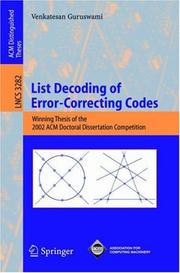| Listing 1 - 2 of 2 |
Sort by
|

ISBN: 3540301801 3540240519 Year: 2004 Publisher: Berlin ; New York : Springer,
Abstract | Keywords | Export | Availability | Bookmark
 Loading...
Loading...Choose an application
- Reference Manager
- EndNote
- RefWorks (Direct export to RefWorks)
How can one exchange information e?ectively when the medium of com- nication introduces errors? This question has been investigated extensively starting with the seminal works of Shannon (1948) and Hamming (1950), and has led to the rich theory of “error-correcting codes”. This theory has traditionally gone hand in hand with the algorithmic theory of “decoding” that tackles the problem of recovering from the errors e?ciently. This thesis presents some spectacular new results in the area of decoding algorithms for error-correctingcodes. Speci?cally,itshowshowthenotionof“list-decoding” can be applied to recover from far more errors, for a wide variety of err- correcting codes, than achievable before. A brief bit of background: error-correcting codes are combinatorial str- tures that show how to represent (or “encode”) information so that it is - silient to a moderate number of errors. Speci?cally, an error-correcting code takes a short binary string, called the message, and shows how to transform it into a longer binary string, called the codeword, so that if a small number of bits of the codewordare ?ipped, the resulting string does not look like any other codeword. The maximum number of errorsthat the code is guaranteed to detect, denoted d, is a central parameter in its design. A basic property of such a code is that if the number of errors that occur is known to be smaller than d/2, the message is determined uniquely. This poses a computational problem,calledthedecodingproblem:computethemessagefromacorrupted codeword, when the number of errors is less than d/2.
Error-correcting codes (Information theory) --- Reed-Solomon codes. --- Codes, Error-correcting (Information theory) --- Error-detecting codes (Information theory) --- Forbidden-combination check (Information theory) --- Self-checking codes (Information theory) --- Computer science. --- Data structures (Computer science). --- Coding theory. --- Algorithms. --- Computer science --- Computers. --- Computer Science. --- Data Structures, Cryptology and Information Theory. --- Coding and Information Theory. --- Algorithm Analysis and Problem Complexity. --- Models and Principles. --- Discrete Mathematics in Computer Science. --- Mathematics. --- Automatic computers --- Automatic data processors --- Computer hardware --- Computing machines (Computers) --- Electronic brains --- Electronic calculating-machines --- Electronic computers --- Hardware, Computer --- Computer systems --- Cybernetics --- Machine theory --- Calculators --- Cyberspace --- Computer mathematics --- Discrete mathematics --- Electronic data processing --- Algorism --- Algebra --- Arithmetic --- Data compression (Telecommunication) --- Digital electronics --- Information theory --- Signal theory (Telecommunication) --- Computer programming --- Information structures (Computer science) --- Structures, Data (Computer science) --- Structures, Information (Computer science) --- File organization (Computer science) --- Abstract data types (Computer science) --- Informatics --- Science --- Mathematics --- Foundations --- Signal processing --- Artificial intelligence --- Automatic control --- Coding theory --- Digital techniques --- Data structures (Computer scienc. --- Computer software. --- Computational complexity. --- Data Structures and Information Theory. --- Complexity, Computational --- Software, Computer --- Information theory. --- Computer science—Mathematics. --- Communication theory --- Communication
Book
ISBN: 9783540301806 Year: 2005 Publisher: Berlin Heidelberg Springer Berlin Heidelberg
Abstract | Keywords | Export | Availability | Bookmark
 Loading...
Loading...Choose an application
- Reference Manager
- EndNote
- RefWorks (Direct export to RefWorks)
How can one exchange information e?ectively when the medium of com- nication introduces errors? This question has been investigated extensively starting with the seminal works of Shannon (1948) and Hamming (1950), and has led to the rich theory of error-correcting codes . This theory has traditionally gone hand in hand with the algorithmic theory of decoding that tackles the problem of recovering from the errors e?ciently. This thesis presents some spectacular new results in the area of decoding algorithms for error-correctingcodes. Speci?cally,itshowshowthenotionoflist-decoding can be applied to recover from far more errors, for a wide variety of err- correcting codes, than achievable before. A brief bit of background: error-correcting codes are combinatorial str- tures that show how to represent (or encode ) information so that it is - silient to a moderate number of errors. Speci?cally, an error-correcting code takes a short binary string, called the message, and shows how to transform it into a longer binary string, called the codeword, so that if a small number of bits of the codewordare ?ipped, the resulting string does not look like any other codeword. The maximum number of errorsthat the code is guaranteed to detect, denoted d, is a central parameter in its design. A basic property of such a code is that if the number of errors that occur is known to be smaller than d/2, the message is determined uniquely. This poses a computational problem,calledthedecodingproblem:computethemessagefromacorrupted codeword, when the number of errors is less than d/2.
| Listing 1 - 2 of 2 |
Sort by
|

 Search
Search Feedback
Feedback About
About Help
Help News
News